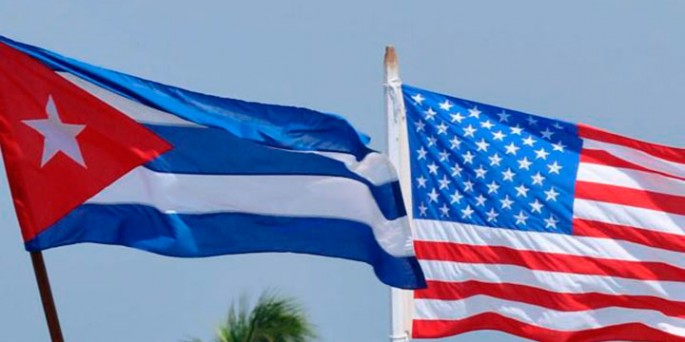
Respect and the wisdom of letting change happen
WASHINGTON, D.C. – Before next week’s opening of the U.S. Embassy in Havana, we wanted to say one last thing about last month’s opening of Cuba’s Embassy in Washington.
Three days after the Cuban flag was hoisted at the Embassy, it was lowered to half-staff, as Rosa Miriam Elizalde reported here. This action, consistent with Cuban protocol dating to the early 1960s, was a response to the official mourning period ordered by President Obama after the act of domestic terrorism in Chattanooga took the lives of four Marines and a Navy reservist.
Cuba’s show of respect, so recently removed from the state sponsors of terror list, seemingly ignored by the U.S. press, should come as no surprise.
As we observed in the electric reactions in Havana to the video footage of President Obama shaking hands with President Castro at Nelson Mandela’s memorial, and the euphoria after Cubans watched their President announce full diplomatic relations with the U.S., and ours quoting Jose Martí, Cubans have longed for a relationship that recognized their country’s sovereignty and dignity.
This agreement is still rejected on principle by President Obama’s hardened critics because he chose to negotiate with President Raúl Castro’s government — and assert he got fleeced in the process — rather than wait for Cuba’s system to collapse under the weight of U.S. sanctions.
But, as former U.S. Senator Gary Hart wrote recently, “We don’t negotiate with our friends; we negotiate with our adversaries. We don’t negotiate with our adversaries to do them a favor; we do it because it is in our national interest.”
Precisely! President Obama determined that a respectful relationship with Cuba — real diplomacy on issues like human rights and U.S. fugitives, opening up Cuba for American travelers and businesses — had a better chance to realize our interests with Cuba and Latin America than the policy he inherited from our long Cold War.
What about Cuba’s interests? What does it get out of this opening?
Some in Cuba are as skeptical as U.S. hardliners. They suspect that the U.S. businessmen and travelers are coming to the island riding a Trojan horse; to them, regime change differs little whether it comes through the back door in the form of USAID urging an uprising or through the front door with a mojito in its hand.
President Raúl Castro has tried to reassure those anxious voices by saying Cuba will not “renounce its ideals of independence and social justice or abandon any of our principles, or give in an inch in the defense of our national sovereignty.”At the same time, he is trying to manage the high expectations of Cubans who are convinced that normal relations with the U.S. will lead quickly to easier lives in Cuba, and respond to the low expectations of Cuban youth who think that nothing will ever change.
As Time Magazine wrote recently, “Over the last few years the Cuban government has relaxed controls over certain sectors of the economy, but reforms have been slow and halting.” Factors undercutting opportunity, as the Miami Herald reported this week, include the dual currency system, restrictions on Cuba’s self-employed, and lack of free access to the Internet. Cubans expected things to get better faster and sooner.
So, President Castro has to keep one eye on the clock — he’s promised to leave office in 2018 – and another eye on the polls. As the Washington Post reported this spring, 69% of Cubans ages 18-34 want to leave Cuba and live in another country, 75% of the same demographic want to start their own businesses, and only 15% are satisfied with the economic system.
The New York Times put names to those numbers in its story “Cuban Youth See New Embassy, but Same Old Drab Life.”
“As much as the young welcome political opening and economic reform,” the New York Times reported, such changes are unlikely to filter down to their lives anytime soon. “Change? My life won’t change,” Yunior Rodriguez Soto, 17, told the paper. “They won’t let it happen,” he said, referring to the Cuban government. “It’s just how they are.”
This is what makes what President Obama has set out to do so important.
Changing a policy that was written in Washington to determine Cuba’s future was not doomed to failure simply because the Cuban revolution resisted it. It failed because it wasn’t right.
The purpose of isolating Cuba and imposing stifling sanctions on its economy was to make Yunior’s life harder. Dropping barriers, opening travel and trade, tacks in the opposite direction; the new policy respects Cuba’s sovereignty, puts our country on the side of Yunior succeeding, and recognizes that it’s up to Cuba’s government to let change happen.
(From Cuba Central)

